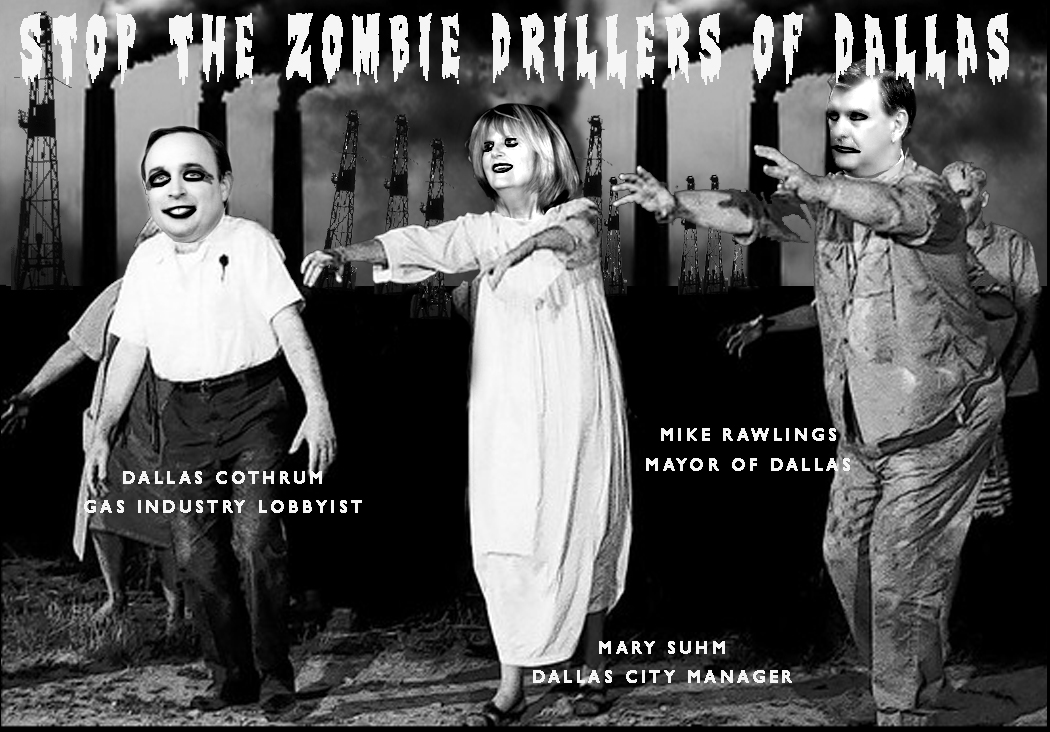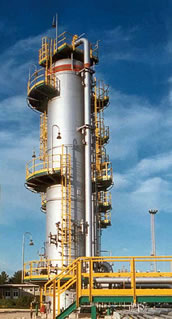Sulfur Dioxide
Dallas City Staff Trying to Pull a Fast One on Eve of Final Gas Ordinance Hearing and Vote
 Thursday's Dallas Plan Commission hearing on a new gas ordinance just got a lot more interesting. At 12 noon today, citizens received the staff proposal for language dealing with compressors stations in Dallas – among the largest, most polluting, most dangerous kinds of facilities in the natural gas fuel cycle.
Thursday's Dallas Plan Commission hearing on a new gas ordinance just got a lot more interesting. At 12 noon today, citizens received the staff proposal for language dealing with compressors stations in Dallas – among the largest, most polluting, most dangerous kinds of facilities in the natural gas fuel cycle.
Staff is attempting to carve out more areas of the cities where compressors can locate, as well exempt them from the already-approved 1,500 foot setbacks from neighborhoods required for drilling wells themselves, as well as exempt them from the vote two weeks ago to require mandatory electrification of all motors and engines.
In other words, city staff probably has a proposed compressor in mind – maybe in the Northlake development or elsewhere – they're trying to write the rules around – just like they tried to do for the Trinity East permits.
What are the changes staff is recommending be adopted tomorrow by the Commission?
1) Staff wants to allow Compressors to call themselves"light industry" and locate in more places in Dallas
Instead of confining them to only Industrial Manufacturing Zoning districts, as was voted on by the Commission two weeks ago, staff has gone ahead and included a brand new category of zoning that would also allow compressors – something called "Industrial Research" districts.
In Dallas, an Industrial Manufacturing district is for "Heavy Industrial Manufacturing Uses with Accompanying Open Storage and Supporting Commercial Uses." That fits compressor stations to a T, since they can emit up to 250 tons per year of air pollution with a "Standard Permit" from the state. They're also subject to tremendous pressures and explosions. They belong in a heavy industrial district.
According to the City of Dallas' own zoning code, the "Primary Use" of facilities in an Industrial Research district is "Research and Development, Light Industrial, Office, and Supporting Commercial Uses."
We know from experience that the only research going on in or around compressor stations in North Texas are experiments on the public health. Staff gives no rationale for allowing compressors to operate in areas of light industry – like warehouse districts – where they would instantly become the nastiest neighbor.
This last minute change is reminiscent of what staff was doing to protect the Trinity East permits before anyone knew about the secret agreement former City Manager Mary Suhm made with the company. Could there now be another company or site the staff is trying to leave open for compressors that wouldn't otherwise be available by sticking to just the Industrial Manufacturing districts the Plan Commission voted for two weeks ago?
2) Staff wants to exempt Compressors from the 1,500 foot setback already agreed to for drilling sites.
Instead of using the distance between operations and neighborhoods the Plan Commission has already agreed is appropriate for well pad sites, staff wants to reduce the distance between larger, more polluting, more permanent compressors stations to just 1000 feet.
This makes no sense at all. For all the real and potential problems at a well drilling site, they're miniscule compared to the pollution footprint of a compressor station. Moreover, the most intense potential releases of air pollution occur at a well site over a period of weeks, or, at most months. Once compressors are built, they're staying put and operating 24/7. If you have a 1,500 foot setback protecting neighborhoods from well sites, shouldn't you also at least provide that same level of protection from a facility that will be pumping out more pollution and also poses a risk of explosion, if not more? But, for some reason, staff wants Dallas residents to be less protected from these kinds of operations.
We need your help at tomorrow's public hearing tomorrow to argue that we need at least the same setback for compressors as we do for well sites.
3) Staff wants to exempt compressors from the requirement to electrify all engines and motors
At their September 12th meeting, the Plan Commission also voted to require electric motors on all gas production facilities. No distinction was made between drilling site motors and generators, and compressors engines. Industry has argued that they can find electric alternatives to every combustion engine including the giant, locomotive-sized engines that run compressors. Since compressor stations are among the largest industrial air polluters, replacing diesel engines with electric ones makes even more sense in a "non-attainment area" for smog like DFW than requiring electrification of all the motors and engines on a drill pad site.
The staff's recommendation that compressors be exempt from required electrification looks to be another special favor staff wants to grant the industry.
These changes, along with others that we're just now receiving word about, are serious enough to cause us to change our plans for tomorrow's public hearing.
Citizen groups be hosting another pre-hearing press conference at 1:00pm in the Flag Room outside the City Council chambers on the 6th floor where we'll be able to itemize the most severe challenges to our goal of getting the most protective gas ordinance in North Texas. THIS IS THE LAST PUBLIC HEARING ON THE ORDINANCE. WE NEED YOUR HELP. Please be there at 1 pm to hear what's at stake and what we need to be calling for in our testimony tomorrow afternoon.
Now is not the time for complacency…..
New Studies Link Air Pollution to Cancer, Heart Failure and…Appendicitis?
 According to CBS News
According to CBS News
"A new study published July 10 in The Lancet showed that even breathing low levels of air pollution for a prolonged period of time could raise risk for the often-deadly lung disease. Another study released on the same date showed that short-term exposure to most major air pollutants could increase the risks of hospitalization and death from heart failure."
Lung cancer risks went up 18% with each increase of 5 migrograms of PM 2.5. Researchers noted that they did not find a level of pollution for where there was no risk, and the results indicated "the more the worse, the less the better" when it came to pollution.
"At this stage, we might have to add air pollution, even at current concentrations, to the list of causes of lung cancer and recognize that air pollution has large effects on public health," Takashi Yorifuji from the Okayama University Graduate School of Environmental and Life Science and Saori Kashima from Hiroshima University in Japan…."
A second study shows the risk of dying or going to the hospital because of heart failure increased by 3.52 percent for every 1 part per million increase of carbon monoxide levels; 2.36 percent for every increase of 10 parts per billion of sulfur dioxide; 1.7 percent for ever 10 parts per billion increase in nitrogen dioxide; and about 2 percent for every 10 micrograms per cubic meter increase of particulate matter. Surprisingly, increases in ozone were not linked to heart failure. Unsurprisingly, you're breahting in all of these kinds of air pollution if you live in DFW.
All of that is kind of old news – put stuff in air, see stuff harm your lungs and heart. But here's a new "adverse health effect" being linked to air pollution – appendicitis. While not as lethal as lung cancers and heart attacks, anyone who's had their appendix rupture can tell you it's not a pleasant experience.
And while ozone may not have been linked to heart problems in that previous study, the New York Times reports a Canadian one links it to a slight increase in your chances of having appendicitis.
High ozone levels were associated with an increased number of hospitalizations for appendicitis and were even more strongly associated with cases of burst appendix. For each 16 parts per billion increase in ozone concentration the scientists found an 11 to 22 percent increase in ruptured appendix cases. The study was published in Environmental Health Perspectives. The associations persisted after controlling for age, sex, season of the year and the presence of other air pollutants, like nitrogen dioxide and particulate matter. The reason for the association is unclear, but studies in mice have shown that air pollution can alter the animals’ abdominal bacteria.
Who knew?
Behind Last Week’s Ash Grove Headlines: “The Rest of the (20 year) Story”
 There was a great deal of official news fluttering last Thursday when the EPA and Department of Justice announced a national settlement with Kansas-City based Ash Grove Cement that confirmed the company's Midlothian plant, site of The Last Wet Kilns in Texas™, would shut down and covert to one large dry process kiln by September of next year. Both dailies reported like it was 1999, with front page headlines and lots of column inches (ask your parents).
There was a great deal of official news fluttering last Thursday when the EPA and Department of Justice announced a national settlement with Kansas-City based Ash Grove Cement that confirmed the company's Midlothian plant, site of The Last Wet Kilns in Texas™, would shut down and covert to one large dry process kiln by September of next year. Both dailies reported like it was 1999, with front page headlines and lots of column inches (ask your parents).
But the newsworthy part of last week's developments was not that Ash Grove was converting its wet kilns to a dry kiln. In February of last year, Downwinders at Risk reported that the company was seeking a permit from the Texas Commission on Environmental Quality to do just that. The Star-Telegram, bless their hearts, even wrote a story about it. Ash Grove's planned conversion was so widely-known that it was the subject of Midlothian Rotary Club meeting speeches this last Spring. So, you know, not news.
It wasn't news because those new national EPA air pollution rules for cement plants that we all drove out to DFW Airport in 2009 to testify in favor of and then to Arlington last year to defend, were expected to put the final nail in the coffin of Ash Grove's wet kilns by the time they took effect in September 2013. TCEQ granted the company a lame one-year extension to the 2013 deadline, but by September 2014, it was pretty clear that Ash Grove's Midlothian wet kilns would have to be converted or replaced to meet those new EPA standards coming down the pike. That's why last year's permit application for the conversion wasn't a surprise, but a confirmation.
And then the Obama Administration decided to stop the standards from coming down the pike. Just as those rules and that 2013 deadline was about to be signed into law, the President changed his mind and put them on hold. His EPA weakened the air pollution standards as proposed and delayed the deadline until 2015 or later – against overwhelming public opposition. All of a sudden, that 2014 deadline for an Ash Grove conversion looked to be in trouble. Would The Last Wet kilns in Texas™ just keep chugging along?
But what do you know? As part of that national settlement announced last Thursday, Ash Grove committed to the government to make the conversion and run the new dry kiln starting in….September 2014, or the original date of dry kiln conversion before the Obama u-turn on the new rules. What a coincidence!
So what was REALLY newsworthy about last week's announcement was that the national EPA managed not to screw-up a very good thing that its now-abandoned tougher rules were already putting in motion on the ground in Midlothian. Lucky us, huh?
The luck had some help from Downwinders. We knew the EPA was looking at Ash Grove for the kind of national enforcement settlement it had cut with LaFarge and other cement companies as part of its multi-year spotlight on the industry. We knew that the former Regional Counsel for the EPA office in Dallas, Larry Starfield, who spent decades dealing with all three Midlothian cement plants, was now in DC as EPA Deputy Enforcement Director, and probably in line to sign-off on any agreement. And we knew the original 2014 deadline for Ash Grove's conversion was in trouble with the Administration's reversal on the new air pollution standards.
We made inquiries, We made pitches. If Ash Grove were the subject of such a national enforcement effort, would it be possible for EPA to please consider requiring Ash Grove's Midlothian plant to firmly commit to its 2014 conversion deadline as part of any settlement? Turns out, it was possible.
How likely would it have been without our intervention? Best not to ask. But if you think, as we do, that our showing-up and making the case made a difference in securing progress that was in danger of being further delayed, here's the tip jar.
So yea for our side, although the victory seems a little less satisfying than what it should be when you know it's simply maintaining the status quo. Still, it's better than another couple of years of pollution from the area's dirtiest smokestacks.
$2.5 million in fines plays well in headlines until you realize how small it is compared to company's annual profits (almost $900 million n 2010). Beside the fines, nine Ash Grove plants will have to better control their smog-causing Nitrogen Oxide, Particulate Matter and Sulfur Dioxide pollution better, including the installation of Selective Non-Catalytic Reduction, or SNCR technology. The Midlothian plant was already scheduled to have this included in its conversion in order to meet those now-abandoned new air pollution standards. There's also a strong possibility that Ash Grove's other wet kilns will follow Midlothian's lead and also be converted to dry kiln technology.
Unfortunately, EPA didn't require any new testing of Selective Catalytic Reduction Technology, as it had in previously announced cement company settlements. SCR is twice as effective at cutting cement plant pollution as SNCR and has been used on kilns in Europe for over a decade. It's state of the art. But it's still not required in the US, although the results from two EPA-mandated pilot tests on kilns in the Midwest are due this year. One good thing about Ash Grove's conversion is that the plants can no longer use their continued operation of obsolete wet kilns as an excuse not to install modern equipment like SCR as it has in the past – although we know they'll find a new excuse now.
Here's the consent decree if you want to read all the details of the settlement. And here's the original complaint, which chronicles the alleged misdeeds of the company, plant by plant, including the sins of the Midlothian facility. A lot of the legal case depends on parts of the Clean Air Act that says any "major modification" to a plant must not increase pollution. Ash Grove ignored this law. Repeatedly. Over the last 20 years. According to the complaint, the violations in Midlothian originally occurred in 1995. That's right, it's taken almost 20 years for EPA to enforce a basic Clean Air Act violation.
"Kilns 1, 2, and 3 at Ash Grove's facility in Midlothian, Texas: 1) in or around 1995, Ash Grove performed a project to re-route ductwork that transports hot air from Midlothian Kiln 1 to the coal mill and performed a project to enable Kiln 1 to burn waste whole tires as a fuel source; 2) in or around 1995, Ash Grove performed a project to re-route ductwork that transports hot air from Midlothian Kiln 2 to the coal mill and performed a project to enable Kiln 2 to burn waste whole tires as a fuel source; and 3) in or around 1995, Ash Grove performed a project to re-route ductwork that transports hot air from Midlothian Kiln 3 to the coal mill and performed a project to enable Kiln 3 to burn waste whole tires as a fuel source."
Downwinders has always argued that tire-burning increases emissions, not decreases them as the industry maintains. We were saying this in 1995 as these illegal changes were taking place and Ash Grove officials were saying what a great air pollution control strategy it was to burn whole tires.
The implications of these kind of very common violations hang heavy over the current industry transition to new and more exotic industrial wastes being burned in kilns, some of which make tires look like Grade-A fuel oil. Plastics, shingles, car parts. All of the Midlothian cement plant are now burning things that they shouldn't be with no more assurance they aren't breaking the law than there was in 1995 when they were changing fuels then. But don't worry, EPA's on the case and you can expect any such violations to be prosecuted in….2033.
Dallas Drilling Scandal Gets Its Very Own SLAPP Suit Threat
 Let's see, so far the Great Dallas Drilling Scandal™ includes illegal drilling sites, a secret agreement, secret wells….in Irving, citizen protests, allegations of Open Meetings violations, likely Open Records violations, a surprise refinery, comparisons to Christ, and at least one grassroots city council candidacy. Missing until now was it's very own SLAPP suit (Strategic Lawsuit Aimed at Public Participation).
Let's see, so far the Great Dallas Drilling Scandal™ includes illegal drilling sites, a secret agreement, secret wells….in Irving, citizen protests, allegations of Open Meetings violations, likely Open Records violations, a surprise refinery, comparisons to Christ, and at least one grassroots city council candidacy. Missing until now was it's very own SLAPP suit (Strategic Lawsuit Aimed at Public Participation).
Check.
Monday saw the announcement that lawyers for the company behind the three controversial Dallas gas permits had sent a nasty letter to one Zac Trahan of the Texas Environmental Campaign telling him to cease and desist in handing out flyers telling people that a casing failure at one of the company's wells in Irving could have harmed groundwater. Since it happened deep underground and there has been no public disclosure of post-failure testing, it's impossible to say whether it caused harm to groundwater or not. But that didn't keep Trinity East from wanting full exoneration. According to a letter from the law firm representing Trinity East,
"That statement is absolutely false. Trinity East's prior well did not contaminate any underground water aquifers. In fact, any casing failure on that well could not have caused or produced aquifer contamination because surface casing was set and cemented at required depths (per Texas Commission on Environmental Quality rules) to protect all fresh water aquifers. TCE's actions are unlawful, and constitute, at a minimum, defamation under Texas law. There is no question that TCE fabricated this fiction and then disseminated it with the specific intent of interfering with Trinity East's rights under its lease with the City of Dallas."
That would be the previously undisclosed lease(s) with the City of Dallas over at the University of Dallas, in Irving (it's complicated) that have only recently come to light after citizen investigation and published reports in the Dallas Observer and Morning News.
The flyers in question were from Dallas Residents at Risk and only claimed that the casing failure may have contaminated groundwater. There's no way that Trinity East's lawyers could prove there was no contamination. We'll probably never know for sure. But the primary point of the letter is not to dispute the statement. It's to scare Zac, TCE and Dallas Residents at Risk into not saying stuff like this again, or they'll sue. Or at least talk a lot like they're going to sue. They'll really mean it. Sort of. Honest.
The tip-off about what this letter is really about is that it didn't come from the law firm representing Trinity East in the permitting process but from a firm (Kelly Hart and Hallman) that apparently makes targeting environmental groups a specialty. Only a short while ago, it actually sued TCE over a landfill expansion dispute. In this case however, Trinity East probably dreads actually taking Zac and Co. to court because then all documents about the (previously undisclosed) well could be reviewed by TCE and the public.
Although it's a sideshow to the on-going scandal over approving permits to do things that aren't legal, Trinity East's letter shows citizens hit a nerve by pulling back the curtain on the company's current operations. Representatives of Trinity East never fail to mention how many wells the company has drilled in the Barnett Shale, but as far as we can tell, nobody at Dallas City Hall has ever researched the company's environmental and safety track record. Once again, it was citizens performing the minimum due diligence that first came across the information on the existence of the Irving wells themselves, much less the casing failure.
Oh that. On February 7, 2013 Trinity East Energy's Tom Blanton told the City Plan Commission that "Trinity East Energy has never had a casing failure." Was he forgetting about the Irving well? Was he fudging a bit because it was done by the "Expro Energy" part of Trinity East? Or was he just not telling the truth? No matter, Dallas City Hall took the claim at face value and never checked. Why not? Maybe because they knew that doing so would reveal a long-standing prior relationship between the City and Trinity that included a well with a casing failure. Wow. That would be embarrassing.
Perry’s Coal Rush Ends With a Whimper, not a Bang
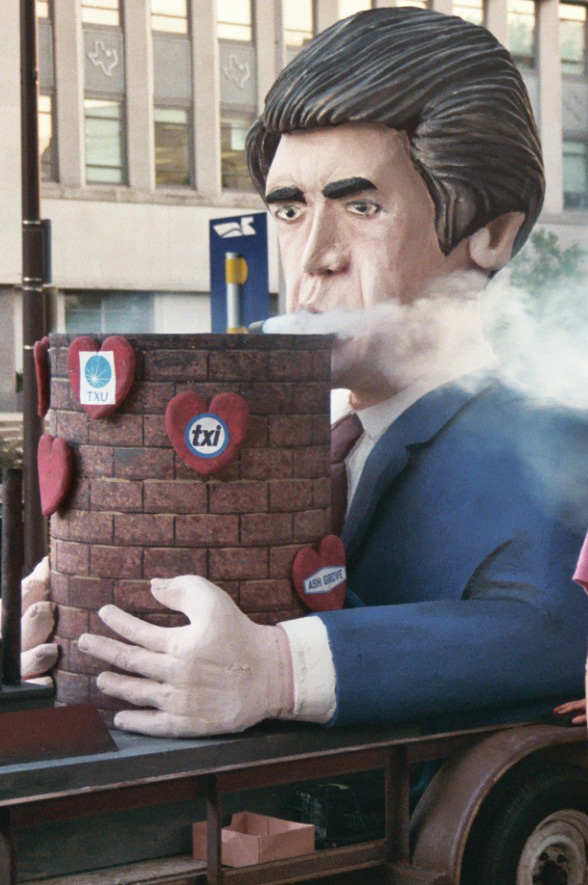 In 2006, Governor Perry announced that he was going to fast track over a dozen new coal plant permits in East and Central Texas. There was an instant hue and cry. Not only citizens but cities protested. Believe it or not, the same Dallas City Hall now prostituting itself for gas refineries was actually out organizing a multi-municipality alliance with Houston against the coal plants and Perry. Downwinders launched its now infamous "Smokestack Love" cross-state tour, complete with a 16-foot long parade-quality float with a smokestack-inhaling Perry.
In 2006, Governor Perry announced that he was going to fast track over a dozen new coal plant permits in East and Central Texas. There was an instant hue and cry. Not only citizens but cities protested. Believe it or not, the same Dallas City Hall now prostituting itself for gas refineries was actually out organizing a multi-municipality alliance with Houston against the coal plants and Perry. Downwinders launched its now infamous "Smokestack Love" cross-state tour, complete with a 16-foot long parade-quality float with a smokestack-inhaling Perry.
Unfortunately, opponents weren't able to stop all the plants. A leftover 1980's permit for the Oak Grove lignite plant north of College Station did get approved over the objections of local landowners. But most were derailed by fierce resistance or lower natural gas prices brought on by the heavy exploitation of the Barnett and Eagle Ford Shale plays.
Last Thursday, the final domino of that proposed 2006 wave of new coal plants fell with the announcement that the White Stallion plant near Bay City was being canceled.
"The news marks a victory for opponents of coal in Texas, notably the Environmental Defense Fund and the Sierra Club, who have worked for years to oppose the White Stallion and other coal power projects in the state. At this point, there are no longer any major new traditional coal power plants planned in Texas. All of the new projects are primarily natural gas and wind power, with some solar."
Congratulations to all those who worked so hard to see these bad ideas finished off for good. But remember there are still older coal plants in East and Central Texas that are among the largest point sources of pollution in the state, and the nation. Having now eliminated new potential clean air threats from the last of the Perry-proposed coal rush, the Sierra Club is turning its attention to the existing plants that are long past their prime and need to be replaced with cleaner sources of energy.
Remember Those East Texas Coal Plants?
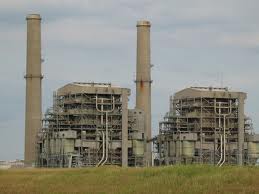 The Sierra Club does. Funded by a $50 million donation from New York Mayor Michael Bloomberg, its Beyond Coal campaign is coming to Dallas-Ft. Worth to take on the old TXU, the operator of some of the most polluting coal plants in the nation, including Martin Lake, the third largest stationary source of Greenhouse Gas pollution in the nation.
The Sierra Club does. Funded by a $50 million donation from New York Mayor Michael Bloomberg, its Beyond Coal campaign is coming to Dallas-Ft. Worth to take on the old TXU, the operator of some of the most polluting coal plants in the nation, including Martin Lake, the third largest stationary source of Greenhouse Gas pollution in the nation.
Hoping to persuade customers to switch electricity providers, as well as hit the plants as contributors to the chronic regional smog problem, the Club is sending at least two organizers up to North Texas from Austin on a regular basis. They'll be supervised by former Downwinder technical adviser and EPA Regional Administrator Dr. Al Armendariz, who's now heading up the Texas franchise of Beyond Coal.
Although some might argue that gas mining in the Barnett Shale has replaced the threat the coal plants represented seven years ago when Governor Perry attempted to fast track the permitting of over a dozen new ones, the old TXU ones still release formidable amounts of pollution because they're so old. A new Texas Tribune interview with Dr. Armendariz lays out the campaign's strategy for taking them on.
Open Meetings Act Violation Filed Against Dallas Plan Commission Chair
(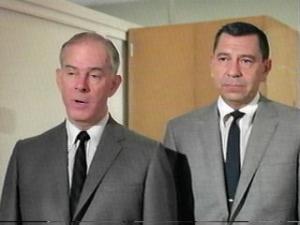 (This release was sent out Wednesday afternoon…..)
(This release was sent out Wednesday afternoon…..)
(Dallas)—In the latest twist over the ordeal of what to do with old gas leases in Dallas, citizens have accused the Mayor’s appointee to the City Plan Commission of taking actions that may have resulted in a violation of the Texas Open Meetings Act while trying to reverse a denial of gas drilling permits for the last of those leases.
A group of four individuals representing themselves and various citizen and environmental organizations filed an official complaint with the District Attorney’s office alleging that CPC Chair Joe Alcantar individually lobbied Plan Commissioners over the phone prior to the CPC’s January 10th meeting in order to win a rare “reconsideration” vote to grant permits for Trinity East’s three controversial gas drilling and production sites in Northwest Dallas.
Lawyers familiar with the statute say if that’s what happened, it could be a violation of the Texas Open Meetings Act known as “daisy-chaining.” Not only would the January 10th reconsideration vote itself be illegal, but any action resulting from that vote – like Thursday’s scheduled public hearing on the reconsideration – could also be illegal.
In a letter to Dallas Mayor Mike Rawlings, City Manager Mary Suhm and City Attorney Tom Perkins, the group referred to the complaint, noting that at least three different Commissioners had independently confirmed that Mr. Alcantar, appointed by the Mayor, systematically called each of them to lobby for the favorable reconsideration vote.
“In this instance, we believe there’s a prima facie case that Mr. Alcantar met (via telephone) with members of the Plan Commission in number more than a quorum to discuss public business in private, the letter reads. “We believe this may constitute a criminal violation of the Open Meetings Act.”
The letter asks Mayor Rawlings to join the group in requesting a full investigation by the District Attorney’s office of the circumstances surrounding the January 10th vote.
“As a result of our concerns, an official complaint, enclosed, has been filed with the Dallas County District Attorney’s Office. We want this matter fully investigated by an objective and independent third party. We ask that you join us in that call for a full investigation by the District Attorney.”
Members of the groups said that while they don’t know for certain if illegal activity took place, the allegations fit the profile of a City Hall that’s twisting the machinery of municipal government in order to get the result it wants.
“There’s no question that someone at City Hall has been tightening the screws on the City Plan Commission,” said Jim Schermbeck of the local clean air group Downwinders at Risk. “Whether that degenerated into the criminal behavior outlined in our complaint is for the District Attorney to discover.”
Besides Schermbeck, Zac Trahan of the Texas Campaign for the Environment, Raymond Crawford of Dallas Residents for Responsible Drilling, and Marc McCord of FracDallas all signed the complaint and the letter. They also all criticized the lack of transparency that has marked Dallas City Hall’s push for gas permits.
“Ever since the original gas leases were signed in Dallas, City officials have retreated behind closed doors,” said Molly Rooke of the Dallas Sierra Club. “This is just another example of a ‘back-room deal’ that affects every Dallas resident, but that no one sees until after the fact.”
Others in the group cited recent legal backflips by the City in what to call a proposed gas processing and compressor station facility just a few hundred feet from the new Elm Fork Soccer Complex. Last year it was a processing plant that would have required a special zoning district. This year, city attorneys say it’s only routine drilling equipment.
“The City is desperately pulling out all the stops in trying to get Trinity East’s gas permits approved,” said Zac Trahan of Texas Campaign for the Environment. “They’ve taken ridiculous positions and attempted parliamentary trickery, but this time their tactics may have gone too far.
——————————————————————————————————————————
Addendum:
Reporters have asked why we're not naming the Commissioners who described the Chair's actions. Here's why:
We don't believe anyone but the Chair is responsible for the illegal conduct and we don't want anyone else implicated. We'll talk about what we know under oath as part of an official investigation. If individual Commissioners want to speak to reporters on their own, that's their business, but we're not going to drag them into this just for publicity's sake.
Time to Push Back and Make Some History
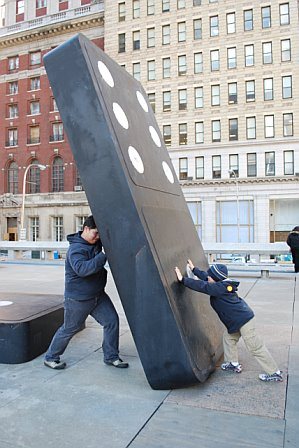 Dallas Plan Commission Public Hearings on Trinity East Gas Permits, including the "Rawlings Refinery"
Dallas Plan Commission Public Hearings on Trinity East Gas Permits, including the "Rawlings Refinery"
Thursday, 1:00 pm
6th Floor Dallas City Hall, City Council Chambers
When the Dallas Plan Commission held its January 10th vote to "reconsider" the denial of gas permits to Trinity East, it didn't allow any public testimony at all about the dangers posed by these proposed drilling and production sites.
Tomorrow it will. And we need you to come and add your body and your voice to this fight.
When the Mayor and City Manager first cooked up this scheme to ram through the last three gas permits in Dallas, they didn't expect to have any roadblocks. They scheduled a meeting five days before Christmas and thought they had it locked up.
They were wrong. You showed up anyway and the Plan Commission voted to deny the permits based on your impassioned pleas for public health and safety.
When City Hall didn't like the results of that vote, and pulled the "reconsideration" stunt in January, 100 of you showed up on a work day to shame the CPC publicly in a meeting that received a huge amount of media coverage.
Now they're holding the second public hearing on these gas permits. We need a larger show of strength to demonstrate we're gaining momentum
We need you to personally come and tell the Plan Commission why it's a bad idea to allow drilling in floodplains and parks and build a refinery next to the city's largest soccer complex where thousands of kids will be playing every weekend.
We know it's getting tiresome, but when you show up at these meetings and hearings, you're helping us win this fight.
Slowly, but surely, your concerns and questions about these Trinity East permits are weighing them down and making it harder for them to get rammed through.
For example, because of your work, we're about to see a bi-partisan call for the Mayor to reject the refinery permit near the Elm Fork Soccer complex. That news will be announced at tomorrow's press conference starting at 1:00 pm.
There's also more in the works challenging the process the City is using to keep these "zombie" permits alive.
The tide is turning. But you have to keep showing up.
Nothing can take the place of a room full of angry citizens. Tomorrow, don't just watch history on TV or read about it the next day. Make history. Thanks.
Zombie Gas Permits on the March Again
Public (re)-Hearing on the Last Three Dallas Gas Sites.……including the newly-discovered "Rawlings Gas Refinery"
This Thursday
1:00 pm
Dallas City Hall
6th Floor
City Council Chambers
Press Conference followed by City Plan Commission Mtg
This is the "do-over" hearing demanded by the Mayor in order to win approval of these permits – after the first one in December resulted in denial.
Come and defend this victory or they'll steal it away from us.
Dallas Residents at Risk, the alliance of groups that we work with on this issue, will be holding a press conference at 1:00 pm – just like we did before the much-publicized January 10th reconsideration vote – and then heading into the CPC meeting at 1:30. Show up early because we'll be talking about a surprising new development in this fight and bringing you up to date with the latest information.
It's important to demonstrate that opposition to these permits is growing, so if you haven't made it down to City Hall before, Thursday is the day to come.
If you're a regular, then you know how much warm bodies in the audience mean to the moment.
They would have been no news coverage on the 10th without all of us standing up and publicly "shaming" the CPC over its "reconsideration vote" in person. You can't do that by e-mail or petition. We need you there. We need you clapping for the good guys. We need you hissing the bad guys. We need you. There is no substitute.
Looking for material for your testimony? Here are some things we know now about these sites that we didn't when the CPC turned them down in December…..
* Neither the Park Board nor City Council ever voted to allow surface drilling in parks. In fact, city staff assured the City Council in 2008 that would be NO surface drilling in parks. So where did Trinity East get the idea it could have two of its drill sites on city park land (The newly-named Luna Vista Golf Course and near-by gun range)? That's a really good question that nobody at Dallas City Hall has attempted to answer.
* One of the Trinity East sites now contains a large gas refinery and compressor station in addition to a pad site for 20 wells. This facility will become the 10th largest air polluter in Dallas the moment it comes on line, releasing 75-100 tons of air pollution every year only 600 feet away from the City's new Elm Fork Soccer Complex on Walnut Hill.
* Last September, the City of Dallas denied a new permit to a rock crushing facility near the Elm Fork Soccer Complex because its 17 tons of annual air pollution was deemed too threatening for children's health. However, five months later, the city is advocating allowing the operation of a gas refinery and compressor station that is estimated to release some 75-100 tons of air pollution a year. Why is 17 tons of air pollution a health threat but 100 tons is OK? Another great question nobody at Dallas City Hall has answered.
* Trinity East knew when it signed its leases with the City that drilling in parkland and the floodplains was prohibited. So why is the City of Dallas still saying its afraid of a lawsuit by Trinity for backing out of the deal if the permits are denied?
We can win if we keep showing up and asking questions.
Please show up this Thursday.
Guess What? That “Drilling” Permit is Really for a Refinery
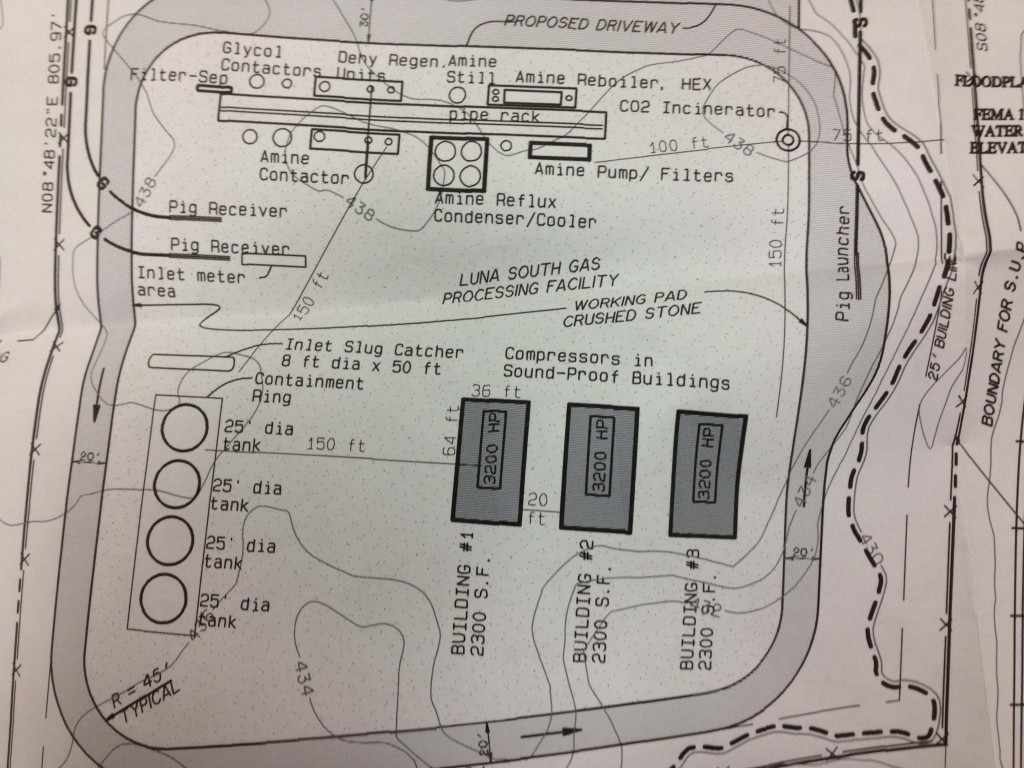 Under the guise of "gas drilling," Dallas City Hall and industry are pressing for approval of a permit that would locate a gas refinery only 600 feet from the new Elm Fork soccer complex, and immediately give birth to one of the ten largest air polluters in the City of Dallas, as well as one of its most toxic.
Under the guise of "gas drilling," Dallas City Hall and industry are pressing for approval of a permit that would locate a gas refinery only 600 feet from the new Elm Fork soccer complex, and immediately give birth to one of the ten largest air polluters in the City of Dallas, as well as one of its most toxic.
"There's a huge toxic Trojan Horse hiding in what the City and Trinity East describe as just a gas drilling permit," charged clean air activist Jim Schermbeck of Downwinders at Risk. "In fact, the Elm Fork permit allows for the building of a gas refinery that houses at least three giant compressors as well as an entire acid gas removal unit that strips off hydrogen sulfide, one of the most dangerous substances in the gas patch."
A motion to "reconsider" the Dallas City Plan Commission's 7-5 December 20th rejection of the Elm Fork permit and two other Trinity East gas sites is being advocated by CPC Chair and Mayoral appointee Joe Alcantar at this Thursday's meeting. If successful, the "reconsideration" would require the CPC to hold a second hearing and re-vote on the permits less than a month after denying them.
Opponents say the move is an act of desperation on the part of the Mayor and City Manager to protect a secret deal that was made between the City and Trinity East when the company first paid for mineral rights leases on city owned land. In interviews, the Mayor himself has said that a "deal was cut." Residents say the public was left out of that deal.
But after making calls to City Hall, Schermbeck is convinced that no one in Dallas city government is aware that the "gas drilling permit" being proposed by Trinity East is actually a permit to build a large gas refinery in the Trinity River floodplains.
"They're in way over their heads. City attorneys are still describing this as a drilling permit, but that's not what takes up most of the acreage on this site – it's all about the refinery."
During the December 20th City Plan Commission hearing on the permit, Trinity East representatives stated that the three proposed compressors alone – huge locomotive sized diesel-powered engines that produce thousands of horsepower in order to move gas through pipelines – would release 25 tons of air pollution each every year for an annual total of 75 tons.
That number would immediately place the facility among the city's ten largest air polluters according to the latest state emission totals from 2010. It would join power plants, asphalt and roofing materials manufacturers, and chemical plants as one of the city's biggest "stationary sources" of pollution.
However, Schermbeck thinks Trinity is low-balling their total air pollution impacts by not including other on-site refinery sources like its battery of storage tanks and "acid gas removal" operation that's designed to strip dangerous hydrogen sulfide off of natural gas streams through a series of acid baths and heat.
Hydrogen Sulfide is a harmful and toxic compound. It is a colorless, flammable gas that can be identified by its "rotten egg" odor. This invisible gas is heavier than air, travels easily along the ground, and builds up in low-lying, confined, and poorly ventilated areas. It acts as a chemical asphyxiant through inhalation exposure and its effects are similar to cyanide and carbon monoxide, which prevent the use of oxygen.
The equipment to strip off Hydrogen Sulfide from raw gas is large, complicated and dangerous. Site plans show a 200 foot long "pipe rack" with at least 20 "point sources" or stacks, apart from the compressors, where pollution could be released into the atmosphere.
"This isn’t a facility you want near parks or kids," said Schermbeck. "Yet, the City of Dallas seeks to put it just 600 feet away from its new huge soccer complex that’s meant to attract thousands of kids for hours every week."
Such a gas facility also challenges regional smog goals. A 2012 study from the Houston Advanced Research Center found that "routine emissions from a single gas compressor station can raise ozone levels by 3 parts per billion (ppb) as far as five miles downwind, and sometimes by 10 ppb or more as far as 10 miles downwind."
The Trinity East numbers don't reflect the release of greenhouse gas pollution either, which could be enormous from a facility the size of the refinery being proposed. Gas processing plants can release 20 to 80,000 tons of greenhouse gases a year. By comparison, the entire inventory of greenhouse pollution from all Dallas industrial sources in 2005 was 25,000 tons a year.
None of this information was brought up at the December 20th CPC hearing on the Elm Fork permit because the permit request in its current form was only a couple of weeks old when it went to the CPC and the compressors were a last-minute addition to an older, pending request.
Citizens were lucky to get a crowd to even show up five days prior to Christmas, and Schermbeck believes no one at Dallas City Hall bothered to notice that one of the so-called drilling permits was a refinery permit.
"Because it had no expertise of its own, and it was ignoring citizens, City Hall was completely reliant on the company's version of what the permit was for, and Trinity East probably didn't want to admit they were stuffing one kind of permit inside of another. The City didn't perform its due diligence. The result is that it's been completely played by the company."
Schermbeck recounted that he could find no one at City Hall who had any idea of how Trinity East arrived at their "25 tons a year" air pollution figure, knew what kind of specific pollutants that tonnage included, or, most importantly, thought it would be good to know this information before the city handed the company a permit to operate an inner-city gas refinery.
"Mayor Rawlings and the City Manager seem content to give Trinity East a blank check to pollute Dallas air," he said.
A closer look at the refinery site plans also reveals equipment that is fundamentally at odds with the way Trinity East and the gas industry has been portraying what kind of gas Dallas has underneath it.
Up to now, gas operators have been saying Dallas gas is "dry" and without a lot of extra hydrocarbons found in "wet gas" further west. But the acid gas removal units and Glycol conductors proposed for the Elm Fork refinery are built for wet gas.
Schermbeck suggests that perhaps either the City has been mislead about the nature of the gas it owns or the nature of the Trinity East site. He theorized that instead of the Dallas refinery being built for dry Dallas gas, it might be aimed at wet gas coming from the west.
"Dallas would get none of the royalties, but all of the pollution."
Mad? Go to this link now and send an e-mail to the Dallas City Council and City Plan Commission that says you oppose these gas permits and the "reconsideration" of their denial by the Commission:
https://www.downwindersatrisk.org/featured-citizen-action
Do it Now.

